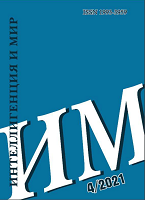Время cтуденчества как этап становления Pусского интеллигента рубежа XIX—XX веков
Time of studentship as a formative stage of a Russian intelligent at the turn of the XX century
Author(s): A. V StepanovSubject(s): Politics, Education, Sociology, Recent History (1900 till today), Politics and society, Higher Education
Published by: Ивановский государственный университет
Keywords: intelligentsia; higher school; students; late Imperial Russia; Moscow University; St. Petersburg Institute of Technology; Mining Institute; Institute of Railroad Engineering;
Summary/Abstract: The article investigates the effect that experience of being a higher school student might produce upon the mentality of a young Russian intelligent at the turn of the XX century. Basing his research upon a number of memoirs and surveys conducted among Russian Silver Age students, the author makes the following assumptions. 1. Becoming a student whose public life was nearly unchecked by academic authorities could not but exert a sort of ―”emancipatory” effect upon a former school pupil who used to be subjected to strict teachers’ control. Love of freedom that was so typical of a Russian intelligent may be partly attributed to this experience. 2. Moving from a small native town to large university cities might be taken by some young men as a leap from Russia’s humble present day into the nation’s tomorrow; such experience reinforced their dream of social change — something that a typical intelligent was distinguished by. 3. A university or college professor — well-read and morally flawless academician — was usually conceived by his students as an example of a perfect intelligent, a person to model themselves on. As a rule, in such decent milieu students tried to pass their exams without cheating, thus not only improving their mental skill, but also strengthening the sense of fairness — yet another value of a Russian intelligent. 4. Daily life of Russian students with limited means was rather hard, usually involving strict saving and all sorts of deprivation. It could not but effect a would-be intelligent — either for good or bad. 5. Participation in social activities (usually restricted by government authorities) pushed some students toward political extremism. Still others might develop a strong distaste for any ill-considered attempts at accelerating the country’s sociopolitical progress. With the stabilization of Russian parliamentary monarchy in 1907, students became noticeably less politicized.
Journal: Интеллигенция и мир
- Issue Year: 2021
- Issue No: 4
- Page Range: 9-34
- Page Count: 26
- Language: Russian

